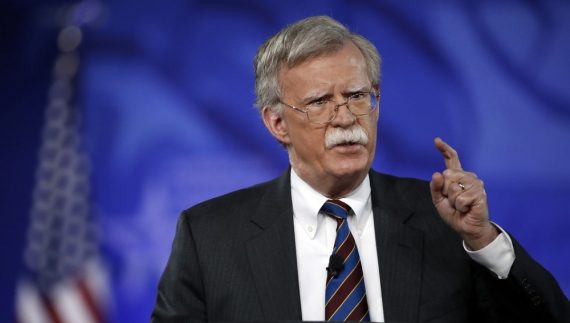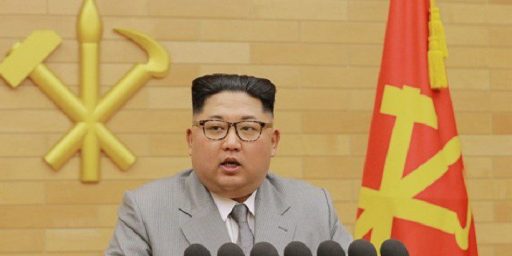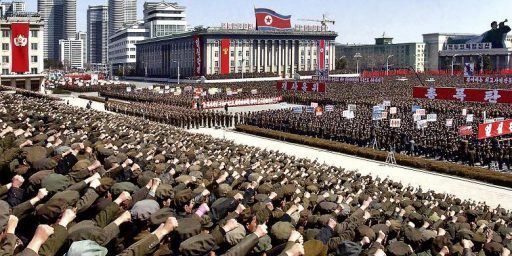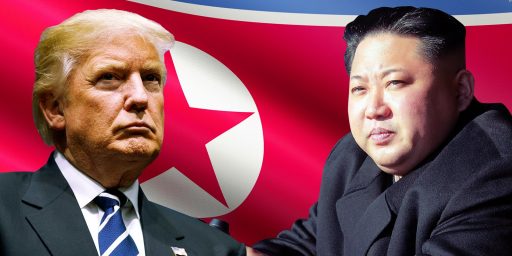Trump’s Selection Of John Bolton Has The World Rightfully Concerned
From Europe to the Middle East, to Asia, America's allies are concerned about what the selection of John Bolton as National Security Adviser means going forward. They should be, and so should every American.
The appointment of John Bolton to be President Trump’s new National Security Adviser has raised concern across the globe:
BRUSSELS — President Trump’s decision to make John Bolton his new national security adviser ricocheted around the globe on Friday, unsettling allies and raising alarm that a hawk who advocates military action against North Korea and Iran will have the president’s ear.
From Berlin and Jerusalem to Seoul and Tokyo, U.S. allies who have long felt that Trump’s unconventional rhetoric on foreign policy often did not translate to concrete policy are bracing for a shift. Following the nomination last week of the hawkish Mike Pompeo to become secretary of state, Bolton’s elevation means that Defense Secretary Jim Mattis is the lone survivor in a ring of advisers who pushed Trump to hew closer to conventional foreign policy positions.
Now, as U.S. policy on North Korea and Iran reaches a crucial juncture in coming weeks, Bolton’s regime-change rhetoric toward both nations may lead to a hardening of policy, allies believe. Europeans, who widely support a 2015 deal to restrict Iran’s nuclear program, fear its imminent demise. Some Israelis — even those who criticized the pact — are also concerned. And in South Korea and Japan, there are fears that Trump is preparing for war if talks with North Korean leader Kim Jong Un fail to yield breakthroughs.
“We would desperately wish to see the United States in a constructive leading role as a steward of the international system,” said Norbert Röttgen, chairman of the foreign affairs committee of the lower house of the German Parliament. He said he worries that Washington is moving in the opposite direction.
“We are concerned that the policy is coming closer to the rhetoric,” he said. Trump ”has now surrounded himself with people who share his intuitions and his general views.”
In Europe, the home of Washington’s closest and oldest allies in NATO, the appointment fueled deeper worries that the Trump administration was further pulling back from international diplomacy and free trade that shaped the globe in the U.S. image after World War II.
Even before the Bolton move, E.U. leaders were gathered for a two-day summit in Brussels that was dominated by concerns about Trump’s tariffs on steel and aluminum, a reversal after years in which Washington was the capital pushing harder for free trade. The shift toward Bolton is likely to exacerbate the growing transatlantic divisions.
It comes days after E.U. and U.S. officials clashed over the future of the Iran nuclear deal, which Europeans are trying desperately to preserve ahead of a key deadline for U.S. adherence to the pact.
The Trump administration has said it will not sign a new sanctions waiver for Iran by May 12 unless changes are made to the agreement on grounds that Tehran has not lived up to the “spirit” of the deal. Bolton has long been a critic of the accord, which Europeans see as critical to avoiding war in their immediate neighborhood.
“With the appointment of Mike Pompeo on the one side, and John Bolton on the other, the group of personalities who have never made any mystery of their opposition to the nuclear deal with Iran is growing,” said Pierre Vimont, a retired senior French diplomat who has been involved in past negotiations with Iran.
Others were sharper in their criticism
“A nightmare comes true,” Reinhard Bütikofer, a German member of the European Parliament, wrote on Twitter.
The fears were less widely shared in Israel, where many are critical of the Iran deal and where Bolton’s appointment was widely welcomed by members of Prime Minister Benjamin Netanyahu’s right-wing government. Education Minister Naftali Bennett called Bolton an “extraordinary security expert, experienced diplomat and a stalwart friend of Israel.”
But even in Jerusalem, his return stirred some concern.
While Netanyahu has lobbied for the United States to “fix or nix” the Iran nuclear deal, some Israeli security officials have warned against a complete collapse of the pact — a prospect that may be more likely with Bolton as national security adviser. They argue that a flawed agreement is better than none at all. Bolton has said that the deal was a ”strategic mistake” and should be ”abrogated.”
Meanwhile, Israel is likely to be at the sharp-end of any conflict with Iran, something Bolton has repeatedly floated.
Writing in the New York Times in 2015, Bolton suggested that Israel should bomb Iran’s nuclear facilities, while the United States simultaneously provided support for Iran’s opposition in order to bring about “regime change.”
“There are two views on Bolton among the Israeli security establishment,” said Ofer Zalzberg, an analyst with the International Crisis Group. “There is a concern that he’s primarily an ideologue and there’s a risk to stability, and others who say he has decades of experience.”
Nor did Bolton’s ascension give hope to Palestinians already infuriated by the U.S. Embassy’s move to Jerusalem.
The appointment of Bolton, who has argued that the Palestinians do not have a right to self-determination, “adds insult to injury,” said Hanan Ashrawi, a member of the Palestine Liberation Organization’s executive committee.
“This is unprecedented, this lethal combination of hard-liners, Israel-firsters, who are in charge of decision making in the U.S.”
Bolton, a vocal advocate of moving the U.S. Embassy to Jerusalem, has suggested a “three-state solution” in which the occupied West Bank is handed over to Jordan, and Gaza to the Egyptians.
Bolton’s appointment is being viewed with concern perhaps nowhere more nervously, though, than in Asia where the prospect for either a diplomatic breakthrough or renewed aggression with North Korea seems to vary back and forth on a daily basis:
HONG KONG — President Trump’s decision to name John R. Bolton as his national security adviser stirred concerns in Asia on Friday about a hardening of American foreign policy that could set the stage for conflict in an already tense part of the world.
Mr. Bolton has taken a hard line on North Korea, and he has expressed skepticism about South Korea’s role in arranging a meeting between Mr. Trump and Kim Jong-un. Mr. Bolton recently said Mr. Trump should tell the North Korean leader that unless he quickly commits in talks to total denuclearization, Mr. Trump should try “something else” — hinting at a pre-emptive American military strike.
After months of painstakingly building a relationship with the departing national security adviser, Lt. Gen. H.R. McMaster, South Korean officials now have to manage their “very bad chemistry” with Mr. Bolton, “who is all about sticks,” said Lee Byong-chul, senior fellow at the Institute for Peace and Cooperation in Seoul.
“We will have to see if Bolton opens his mouth and launches his verbal attacks against the North,” Mr. Lee said. “That will give North Korea an excuse to step away from its summit proposal. The Trump-Bolton team then will ramp up pressure. And we will hear more talk about a pre-emptive strike and see tensions rising again on the Korean Peninsula.”
Some saw Mr. Bolton’s appointment as a sign of confusion within the Trump administration, coming so soon after the announcement of the North Korea talks and the firing of Secretary of State Rex W. Tillerson, who advocated for negotiating with Pyongyang.
The appointment “adds to the perception of the U.S. basically being a headless chicken, which is bad for the world,” said Koichi Nakano, a political scientist at Sophia University in Tokyo.
The initial reaction from South Korea’s government was muted, a reflection of the delicate dance the country’s president, Moon Jae-in, is attempting as he tries to draw the United States toward engagement with North Korea.
A senior aide to Mr. Moon tried to play down fears that Mr. Bolton’s hawkish stance on the North could derail the latest efforts at dialogue, saying that Mr. Trump himself — not his aides — was pushing for a summit meeting with Mr. Kim.
The adviser, who spoke on condition of anonymity given the diplomatic sensitivities, said that Mr. Bolton would be a trusted adviser to Mr. Trump and that South Korea planned to consult with him as it sought to resolve tensions on the Korean Peninsula.
Mr. Bolton has derided South Korea for trying to play peacemaker with Pyongyang, saying the South was “like putty in North Korea’s hands” and that “there’s a sucker born every minute.”
There was no immediate reaction from North Korea, which has recently refrained from its usual bellicose attacks on the United States. In the past, the North has refused to deal with Mr. Bolton, calling him “human scum” and a “bloodsucker.”
The concerns about Bolton are well-founded, of course. During his time in the State Department, his later tenure as U.S. Ambassador to the United Nations, and the statements he’s made in writing and during his numerous Fox News Channel appearances in the intervening years have established him as being one of the most hawkish commentators on the right. On Iran, for example, he has been a harsh critic of the Joint Comprehensive Plan Of Action (JCPOA), the deal that led to internationally supervised inspections and limitations on Iran’s nuclear research program that only came about because of a unified sanctions regime that would be hard to reconstruct. Beyond criticizing the deal, though, Bolton has also been a consistent advocate for a much more confrontational approach toward the Islamic Republic, including repeated occasions over the past decade where he openly advocated for military strikes either by a U.S.-Israeli combined for or a unilateral Israeli attack. On North Korea, he has been largely dismissive of the recent seemingly warming of relations between the DPRK and South Korea and the proposal for direct talks between North Korean leader Kim Jong Un and President Trump. Most recently, for example, he called for preemptive war against North Korea even as the rest of the world was hoping for a diplomatic breakthrough.
The Editors of The New York Times put it best:
Over a 30-year career in which he served three Republican presidents, including as United Nations ambassador and the State Department’s top arms control official, Mr. Bolton has largely disdained diplomacy and arms control in favor of military solutions; no one worked harder to blow up the 1994 agreement under which North Korea’s plutonium program was frozen for nearly eight years in exchange for heavy fuel oil and other assistance. The collapse of that agreement helped bring us to the crisis today, where North Korea is believed to have 20 or more nuclear weapons.
(…)
On Iran, Mr. Bolton and the president are in sync, with both arguing that the United States should withdraw from the nuclear agreement by a May deadline. In March 2015, he argued in a New York Times op-ed that only military action like Israel’s 1981 attack on Saddam Hussein’s Osirak reactor in Iraq or its 2007 destruction of a Syrian reactor “can accomplish what is required.”
Going to war in either of these cases would not only create unnecessary bloodshed, it would be disastrous for the United States and its allies, South Korea and Japan. The Iran deal has substantially halted the nuclear program and needs to be maintained. Negotiations between the United States and North Korea, given a new impetus by Mr. Trump and Mr. Kim, need to be tested.
Mr. Bolton’s position on Russia, that NATO must have a strong response to the Kremlin-linked poisoning of a former Russian spy in Britain, is somewhat better than Mr. Trump’s. But his rejection of a two-state solution to the Israeli-Palestinian conflict and endorsement of a book by the anti-Muslim activist Pam Geller are unacceptable positions for a top American official.
Mr. Bolton is certain to accelerate American alienation from its allies and the rest of the world. Congress may not be able to stop his appointment, but it should speak out against it and reassert its responsibilities under the Constitution to authorize when the nation goes to war.
To be sure, the selection of Bolton to replace McMaster, as with the decision to replace Rex Tillerson with Mike Pompeo, signals that we’re likely to see a far more hawkish turn in foreign policy from this White House than we’ve seen to date. As a practical matter, that likely means that Trump will go ahead and pull out of the JCPOA before the upcoming May deadline and that we’ll be seeing a more confrontational attitude toward North Korea that will either make the idea of talks between the U.S. and the DPRK far less likely or simply guarantee that nothing will come of those talks. Both of those moves will be strongly opposed by America’s allies in Europe and in Asia, and will just go further to alienate the United States from the rest of the Western world at a time when unity in the face of threats such as the continued terrorist threat from groups like ISIS and al Qaeda, a resurgent Russia, and a rising China. Notwithstanding the fact that this President seems obsessed with spending ever more on an already bloated military budget, all of this will serve to make the United States weaker internationally at a time when what we need is strength, allies, and a decisive and coherent foreign policy. Instead of that, we’ve got pseudo-strength, alienated allies who can’t be sure if they can count on the United States in a crisis, and a rambling and incoherent foreign policy. That’s a recipe for disaster, and other than the Secretary of Defense, there doesn’t appear to be anyone sane left in this Administration. That doesn’t bode well for the future.







“other than the Secretary of Defense, there doesn’t appear to be anyone sane left in this Administration.”
And his nickname is Mad Dog..
We’ve been very lucky because everyone in the administration to date has been incompetent and with all the chaos they haven’t been able to get anything done. If Bolton can silence some opposing voices and manipulate Donny Dennison…we could find ourselves at war pretty quickly.
The weird thing is that Dennison and Bolton hold some pretty opposite views. Did Donny hire him just because he is on TV? Or because no one wants to work in this white House and Bolton was as good as he could get?
When a guy who has worked under three previous GOP Presidents, including the most recent one before Trump, is considered a dangerous ideologue…that might be a sign that Donald Trump isn’t really the problem.
“That doesn’t bode well for the future.”
It’s hard to take that sentiment seriously from someone who goes out of his way to willfully ignore any and all positive foreign policy developments under Trump…you know, like those talks with the North Koreans about which you are now so concerned. Refresh my memory, please, and explain to me how those talks came up again. I seem to recall near universal criticism of President Trump’s handling of North Korea and then, somehow, they wanted to talk. What exactly happened?
Mike
@MBunge: The possibility that they may be problems in different ways doesn’t occur to you?
Indeed. And how long will Mattis stay around? He’s the last remaining grown-up, all that stands between us and a crime against humanity that will destroy what is left of American prestige. A war in NK hands Asia to China for the foreseeable future. A war with Iran would unleash a wave of terrorism like nothing we’ve seen – and it won’t be aimed at Europe, this will all be on us. I can’t imagine the Qataris – already sold out by Kushner’s need for cash – will allow our base to stay.
We are looking at the very serious possibility of the United States acting with no more of a fig leaf than the Nazis had when they rolled into Poland. This could be a real disaster. Not some piddly 911, but a real disaster.
@Daryl’s other brother Darryl:
Because Bolton kisses the Orange Ass’ ass publicly.
Bolton is a frightening choice, flat out.
All of Trump’s recent additions have been people he’s seen on TV. He literally is picking people for his administration depending on how they do on television.
Virtually every foreign policy development under Trump has been either a mixed bag or utter disaster, or utter disaster-in-waiting. We’ve alienated our allies, we’ve ticked China off with a trade war, and there are no competent diplomats available to clean up this idiot’s messes. The State Department is hollowed out. There is nothing, and I mean nothing, to cheer about here yet.
Peace between North and South Korea would be nice, but let’s see how that all plays out before breaking out the bubbly, shall we?
@MBunge:
You really have no grasp of foreign policy, do you?
Any comment on Guccifer 2.0, who Roger Stone talked to often, being Russian intelligence…thus making the collusion link?
Yeah…I thought you would just run away, like always.
@MBunge:
I understand why you have high hopes about the NK talks, but sometimes I wonder if you’re getting ahead of yourself.
They haven’t even happened yet. There’s been no agreement. There’s been no compliance. Why are you so impressed?
@Jen:
Of course everyone Trump picks, or listens to, is someone from television. He doesn’t/can’t read. He has the attention span of a flea on crystal meth. His “policy” is determined by whomever last had his ear. This is someone who claimed that he knew more about ISIS than “the generals” because he watches “the shows.”
@James Pearce: Has there been a reply from Pyongyang? I haven’t seen any maneuvering over sites and such and I’ve actually been looking about from time to time. From what I can tell the only ‘public access’ information is the ROK Pres Moon offered to be a third party at the sessions. And no answer from Washington or Pyongyang on THAT. Lots of radio silence.
Mike, what NKorean talks are you referring to, m’boy?
@MBunge:
North Korea has always wanted unilateral talks with United States president. That has been a foreign policy goal of North Korea for at least 25 years. Until now, American presidents refused, and insisted on multi-lateral talks including our allies in the region and China, because the Chinese have more influence with North Korea than we do and we believed our allies (especially South Korea and Japan) have vital interests that need to be addressed in those talks. So it’s not like North Korea consistently refused to negotiate until now.
There may be valid reasons for the U.S. to abandon the standing policy of multiple administrations from both parties to insist on multi-party talks and instead agree to two-party talks directly with North Korea, but only a fool would think that Trump had reviewed the reasons previous administrations had refused unilateral talks and decided that the policy should change for sound, practical, well-considered reasons.
The founding fathers anticipated the chance that a president could be dangerously unqualified. and so gave Congress oversight authority. They also gave Congress the sole authority to go to war. The Republicans have abdicated the first. And the Democrats and Republicans both, over the course of 40 years, have abdicated the second. Unfortunately, this is playing out exactly as I feared. Those who said “We have to give him a chance, the realities of the office will control him” were guilty of a category error. That is true for normal presidents. It is not true for a true narcissistic moron like Trump. Our one hope was that the Republican controlled Congress would have recognized the danger and taken action. That didn’t happen. Now we can only hope that we can make it to November and the Dems take both the House and the Senate. And the Senate is an almost impossible task.
Maddow is reporting that someone in Congress – someone who will not identify themselves – snuck new Russia sanctions into the 1.3 trillion Republican budget. The bill Trump signed into law.
I would pay serious money to be in the room when the baboon finds out.
@MBunge:
Yes. The last Republican President launched an unprovoked war which killed roughly a million civilians, and destabilized the Middle East for decades, making us all less safe.
Donald Trump is merely a symptom of the problem.
@MBunge: John Bolton is pretty much completely out of line with the foreign policy priorities Trump ran on. John Bolton would actually be a major reason for a lot of the stuff you claim “got us Trump.” John Bolton is a member, in decades-long standing, of “the swamp.”
In a world where Trump supporters weren’t deluded cultists, the choice of Bolton would cause an outcry among them, but, as you’ve come here to demonstrate, that’s not the world in which we live. So Trump can choose as his National Security Adviser a major proponent of a war Trump called “the single worst decision ever made,” and you all just fall in line. There’s not a single independent thought among you.
@James Pearce:..Why are you so impressed?
As I suspect you know, Bunge is impressed with Bunge and his boyfriends Putin and Pud and not much else.
Further evidence of Donnie’s damaged psyche — he has no problem with Bolton’s “preemptive strike” mindset, but that mustache gravely concerned him.